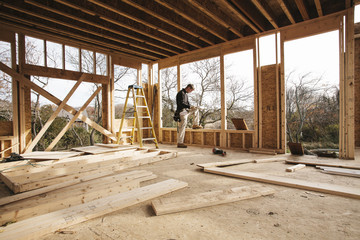I regularly talk to clients who have signed building contracts and whose projects have gone off the rails.
Sadly, the standard domestic residential building contracts don’t offer much protection to owners when things go wrong.
In this article we will explore three common problems:
- Demands for extra payments;
- Front loaded progress payments;
- Builders that don’t finish.
We will then discuss the steps you might take to try to better protect yourself before you sign a building contract.
Extra Payments
I have spoken to many owners who have been pressured by builders to make payments above and beyond those specified in the building contract.
This might be paying money earlier than required by the contract or a request for an amount above and beyond the contract price.
Whilst it might seem easy from a distance to say “no”, in practice it is a little harder. Often the owner is from an ethnic background and may be unfamiliar with Australian laws and easily intimidated. The builder may well threaten that they won’t resume work unless the money is paid.
Naturally allowing the builder to get away with these sorts of demands is rarely going to end well. In some cases the builder has come back for a second extra payment.
Front Loaded Progress Payments
I believe that the standard payment schedule for Victorian domestic building contracts is overly favourable to builders. Compared to commercial contracts, there is no retention of funds and large amounts are paid to the builder relatively early in the project.
However, builders are increasingly seeking to further accelerate payments by increasing the early stage payments and excluding certain works from the definition of stages. Bottom line is that the builder gets more money earlier.
Builders claim that costs are going up and both suppliers and subcontractors are increasingly asking for large deposits. That is the builder needs more money from the owner earlier.
The problem is – if too much money is paid up front, there may not be enough money in the back end of the project to cover the cost to complete the work. This may be especially problematic if there are substantial defects to remedy and extended delays mean that there are high liquidated damages to be paid by the builder.
Builders that Don’t Finish
I have seen too many owners recently where the cost to complete the project is well in excess of the balance payable to the builder. In a world where many builders are struggling, it is hard to see a builder finishing the project if there is $100,000 left to be paid under the building contract and $200,000 worth of work to do.
This leads builders to start stalling. They won’t outright stop work – but work will be reduced to a minimal level. The builder will constantly make promises that they will be back ‘soon’….
The way building contracts work, it is often better for the builder if you terminate the contract. The standard HIA and MBA contracts don’t allow you to claim liquidated damages on termination so the builder gets off the hook for delays. If you do try to recover the increase in building costs from using another builder you are likely to find that the building company has no assets. This means it is not worth pursuing the builder for your losses through the court system.
Some Suggestions
It’s a simple point – but the first thing to know is that if you do find yourself in this situation, you are not alone. If you haven’t signed a contract it is worth contemplating how to ensure you don’t find yourself in one of these situations.
The first is doing your homework. Make sure your builder has a solid track record of doing qualify work and completing projects on time and on budget. This will require a combination of internet searches, speaking to past customers and gathering whatever other information you can find.
The second is making sure that the contract is fair. Special conditions can be inserted to ensure that defects are remedied in a timely way, payment schedules are appropriate and termination provisions are more balanced – amongst other issues.
Finally, if your builder is starting to make claims for things that are not allowed under the contract – get some advice. If your builder is behaving badly there may not be an ideal outcome. However, we can work with you to try to ensure that your project is completed as efficiently and with as little extra cost to you as is possible in the circumstances. For example, making selected payments to subcontractors on the basis that these will be credited as payments under the building contract may be one way to get your project finished.
Advice
For these reasons and more – when presented with a domestic building contract I believe you need independent legal advice BEFORE you sign a building contract.
Builders are very good at pressuring owners to sign contracts quickly and presenting the standard HIA / MBA domestic building contracts as somehow being unable to be amended.
The truth is that these contracts are prepared by the Builder’s Associations to serve the interests of the builders. If something goes wrong, many owners will find themselves between a rock and a hard place.
Lewis O’Brien & Associates offers fixed price building contract reviews for the standard domestic building contracts. There include:
- A formal written review of your building contract;
- Our recommended special conditions to restore a sense of fairness; and
- A 30 minute zoom consultation with me to answer any questions you have about our review, the special conditions of the contract generally.
If you would like a more cost effective alternative, you can purchase our standard recommended special conditions for common domestic building contracts here. This includes a brief explanation of the issue and our recommended special condition to insert into your building contract.
If you aren’t thinking of signing a building contract, but know someone that is please share this article with them.

Lewis O’Brien
Your Preferred Property Lawyer
